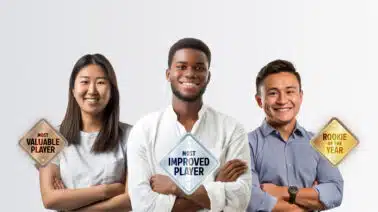Find the right nanodegree program for you.
Start Learning

At Udacity, our careers team is busy every day helping students advance their careers, and we get to work with an incredibly broad group of job seekers who are diverse in location, age, experience, career goals, and more. Despite their differences however, there are certain characteristics that all job seekers share, whether they’re entering the job market for the very first time, or making a career change after 15 years in their field. For example, everyone has questions about recruiters!
This is understandable. Recruiters have an extremely significant impact on the hiring process, but most of us know very little about them. So we’re going to remedy that today, by taking you inside the mind of a recruiter!
 Jason Wong is Udacity’s Head of Recruiting, and he’s kindly offered to answer some questions about recruiters and the recruiting process. He’s even going to give you his Top 5 Recommendations for a Great Job Application!
Jason Wong is Udacity’s Head of Recruiting, and he’s kindly offered to answer some questions about recruiters and the recruiting process. He’s even going to give you his Top 5 Recommendations for a Great Job Application!
Jason, thank you for sharing your thoughts with us!
Q: We’d love to start off with the most common question job seekers ask. Are all the technical skills in a job description required?
It depends on the company. Some companies take the approach where they may include a number of technical skills to cast a wide net and show up in more search results. Recruiting is a competitive field, and increasingly, recruiters are turning to techniques similar to what marketers use, in order to get their job postings seen. Listing skills becomes a kind of “optimization” tactic. That’s why it’s important for job seekers not to be intimidated by those lists of skills, because often, they’re just there to help get visibility for the post, as opposed to actually reflecting the requirements of the role. The company is realistically only looking for someone who has some of the skills. At the same time, serious job candidates should know which basic skills are typically required.
Udacity, however, takes a different approach.
Q: Could you elaborate on that? How does Udacity approach job descriptions?
At Udacity, we want to attract a wide pool of candidates, so we don’t have that many “hard” job requirements. For example, in our software engineering job descriptions, there are a few technical requirements, but mostly you’ll find “soft skills” such as team collaboration, and passion for education.
We work hard to really represent the day-to-day realities of the job, so that the requirements will actually show candidates what’s needed to succeed in the role.
That said, we make sure to only portray the necessary qualifications—we leave the rest broad and open.
Q: What is the reasoning behind having the job descriptions be broad and open?
We want to attract people with diverse backgrounds, because we know they’ll bring something new and different to our teams. Having a different mindset, a different worldview, a different set of experiences—it’s really valuable and exciting to bring in new perspectives and new energy.
Plus, most companies, especially in tech, have the mindset that anyone can learn anything, and a big part of the culture is the expectation that people will always be learning, whether from peers, on their own, or from a mentor or manager. So it’s important that incoming and/or junior candidates have strong communication and collaboration skills, and are fast, proactive learners.
We want to make sure we attract these kinds of candidates, because they’re more likely to grow professionally at the company. So while we may have some firm technical requirements, we keep the rest as broad and as open as we can, to ensure we keep our doors open for as many different kinds of candidates as we can reach.
Q: What are your Top 5 Recommendations to have a great job application?
- Resumes should be one page, regardless of your experience. Udacity has a lean recruiting team and we get thousands of applications. As much as we’d want to, we are very unlikely to read a 2-page resume. Candidates should make it easy for us to get a sense of their qualifications and passion for the job. We care most about what you’re up to now or recently; the older stuff isn’t as important.
- Do not have any typos or design inconsistencies. If people misspell Udacity or any other word, we can’t take them seriously. (Automattic, which runs WordPress, even writes in their application instructions to not misspell the company name!) Simple typos, or margin errors here and there, add up and make for a messy looking application. It’ll give us the impression you didn’t take the application seriously enough to notice or fix errors. When we see things like this, we lose our trust in your ability to do the job, and we opt to move onto other candidates with better attention to detail.
- Research the company and tailor your application to align with the company’s goals. If it’s clear to us you’ve researched Udacity and understand what we do, you’re much more likely to be considered. It’s really obvious to recruiters when an applicant uses the same resume or cover letter and spams a bunch of different companies.
- Know your audience. Keep in mind different people will read your application. As a recruiter, I focus on your resume, GitHub profile, LinkedIn profile, etc., over other materials.
- Ask for a referral. If you know someone at the company, please reach out to them. We love referrals! A referral gets you a step closer than you would be otherwise, because it’s a vote of confidence from someone we already know and trust. If you don’t know someone at the company, see if you know someone who does. Maybe they could make introductions for you.
Networking is really important, and when you find the job you want to apply for, that’s the time to turn your networking efforts to your advantage. To be blunt, use your network!
Q: What are some recommendations for interacting with a recruiter?
- Remember that a recruiter is not a gatekeeper standing between you and the job you want. A recruiter is someone who measures their own success by finding great hires; your goal is to be that hire, and if you go in with that attitude, you’ll see that the recruiter is on your side.
- Keep it professional. Even if it’s a startup, even if there are pictures of employees playing ping-pong on the company website, you’re trying to get a job, so when in doubt, err on the side of professional. Don’t overdo it of course. Part of your task is to prove you’re a good fit for the company’s culture. But you’re never going to go wrong by making it clear you take the opportunity seriously.
- Make sure to communicate your goals to us. Whether you’re connecting in-person or online, start by giving us a brief description of who you are and what you’re interested in. Mention why my company interests you. If you’re connecting with us on LinkedIn, include a personal message. Otherwise, we don’t start with a good sense of who you are, and it’s less likely we’ll respond to your request.
Q: What are some tips for interviewing well?
- Demonstrate and speak about your passion and motivation. This is how you can connect to your interviewers and communicate you’ll be proactive and a great contributor to the team.
- Don’t lie about your skills. You’re going to be assessed on those skills. Don’t say you’re an expert if you’re a beginner. If you don’t know something, ask questions or even follow up after the interview with an email after you’ve done research.
- Don’t be negative. Even if you had a bad experience with a previous employer, try to speak about the positive—such as what you’ve learned. If you speak negatively, we’ll perceive you as negative.
- Describe something in detail without having to be asked. Don’t go on a tangent, but if it’s hard to get more details out of you, we’ll get the impression you wouldn’t be able to communicate or collaborate well across teams. Talk about the projects you’ve worked on and focus on what you did beyond meeting the bare requirements.
- Pick up social cues. An interview is a test on how you’ll work in a team. Udacity always interviews in panels made up of representatives from different teams. Most interviews, even technical ones, are conversations. Don’t be too casual, but do get comfortable, and try to have an easy conversation with your interviewer. If you take the job, they’ll be your co-worker after all!
- Tell interviewers why you want to join the company. This is your opportunity to help me really see you in the role. It’s your job to show me why you, and only you, are the right candidate. So try and avoid telling me things that aren’t specific to Udacity, or to the role. If you lost your last job, or you’re looking for a change, that’s fine, but that doesn’t tell me why you want this job, at this company.
You can’t save yourself after being caught lying about your skills, but if you’re honest, you can still make a case for yourself that you can learn those skills.
Q: There’s one final, commonly-asked question. How should I approach salary negotiation?
I want to put the emphasis on the word negotiation. You have an idea of what you want, and I have an idea of what the company wants. We have to both be honest and open. Even if we both have different ideas on compensation, I go into this process believing we will be able to work something out.
You can do some research on Glassdoor or Paysa if you want an idea of a salary to ask for. However, know that data can be skewed. Recruiters don’t go into salary negotiation with the intention of coming out with a low number; we go into negotiations wanting to see what the amount is that will seal the deal with the job candidate.
~
Huge thanks to Jason for giving us insight on the application and job search process from a recruiter’s point of view. Now that you know what recruiters are looking for in job candidates, use this information to pursue your next job!
Virtually all of the recommendations we discuss above—from resume optimization to LinkedIn networking to interview preparation—are part of your Nanodegree experience when you enroll in a career-ready program. Our Udacity Careers team is committed to seeing you realize your career goals, and alongside all the skills and tools you master in your program, you’re going to benefit from the career projects you’ll find in your classroom. Enroll today, and you’ll have us by your side from enrollment to hired!
~
Udacity is where lifelong learners come to learn the skills they need, to land the jobs they want, to build the lives they deserve. Enroll in a Nanodegree program today!



